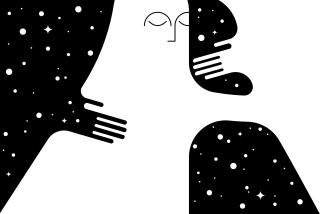Shedding Stigma of the ‘Psycho’ Straitjacket
- Share via
A few years ago, an acquaintance told me that he had once checked himself into a psychiatric ward. “For depression,” he said. He emphasized its limited nature by adding: “Just depression.” Then he volunteered that he does not take antipsychotic medication.
This unprompted qualifier didn’t surprise me. Battling depression is one thing, wrestling with hallucinations and delusions another. Even some people who are comfortable talking about their mental illnesses camouflage the severity of their experiences by avoiding the term “psychosis.”
Throughout our lives we hear people mocked as “psychos.” We watch Alfred Hitchcock’s movies and come away stereotyping “psychotics” as creepy loners with mommy complexes who murder those they love.
The reality is far more filigreed. I was once diagnosed as schizo-affective, and have grappled with psychotic depression. Never have I been a threat to anyone except myself.
In 1997 and 1999, I had psychotic breaks that brought me close to suicide and landed me in USC’s psychiatric ward the first time and UCLA’s Neuropsychiatric Institute the second.
In February 1999, during the inchoate stages of my relapse, I sensed that I was receiving subliminal messages from the media. The Los Angeles Times featured a front-page story about a manhunt for a child molester who matched my description -- 5 feet 10 and white or Latino. Even though I knew I was innocent, I also “knew” that the newspaper was tormenting me with this story and that the police sought me for this crime.
Then I turned on the TV and a gay man spoke of the difficulties of being gay as a youth. I am heterosexual, but I surmised that certain individuals had conspired to brand me as gay. I also imagined that they thought I was a serial killer -- metaphors for my alienated, powerless state.
Convinced that the CIA or FBI had programmed the TV to harass me, I flipped the dial on the radio, and senators were voting to impeach President Clinton, one of the few people I believed could save me from this conspiracy. My then-girlfriend Barbara’s condominium was no escape because I was sure it was bugged. I whispered furtively and avoided mirrors because they might be see-through.
Ultimately, I fled Barbara’s home, suspecting she was an alien or CIA spy. I rambled roughly 16 harrowing miles from Glendale to Westwood, certain that I would be assassinated. I dodged through traffic in Hollywood to avoid a cluster of hoboes I thought were FBI or CIA operatives. I rushed past car washes and tire dealerships to evade the chemical sprays that I believed would destroy my memory, as per an L.A. Times story I had read the day before.
At one point on my nightmarish journey, I found myself trampling down Venice Boulevard. I was contemplating jumping in front of one of the cars that raced toward me, when I heard an ethereal noise, as if the clouds had opened and the heavens were welcoming me with their sweet, mystical music.
I stamped my feet defiantly on the pavement. Like Hamlet questioning the reality of his father’s ghost, which he feared might tempt him to leap from a parapet, I perceived that the empyrean spirits, sweet as they were, might be false ones. Despite my hallucinations and delusions, I knew I needed help.
It has been six years since I swirled in the psychic vortex. Since then, I have remained employed at the L.A. Weekly, where I started working after my first break. Not long after recovering from my relapse, I moved in with Barbara. She and I have been married now for four years.
According to the National Institute of Mental Health, 18.8 million adult Americans in any given year endure some form of depression, whether dysthymic (chronic, mild), major or bipolar. About 8.4 million adult Americans had a major depressive disorder in 2002, says Dr. William Narrow, director of psychopathology research with the American Psychiatric Assn. And 12% of those -- nearly 1 million adults -- have had or will have a psychotic episode.
I doubt many divulge this to their employers or friends. The “psycho” label’s poisonous stigma remains far too potent.
Some people with mental illnesses do become physically violent. The overwhelming majority do not. Having subdued my mental illness, I feel that my past psychosis reflects a calling. Perhaps, as Hamlet says, “there’s a divinity that shapes our ends, roughhew them how we will.”
I applaud television host Larry King for interviewing candid guests such as Mariette Hartley and Mariel Hemingway on depression. But no one over the years has talked about grappling with psychotic depression. King and others could penetrate the taboos even further by including those of us who admit to experiencing and overcoming hallucinations and delusions.
More to Read
Sign up for Essential California
The most important California stories and recommendations in your inbox every morning.
You may occasionally receive promotional content from the Los Angeles Times.













